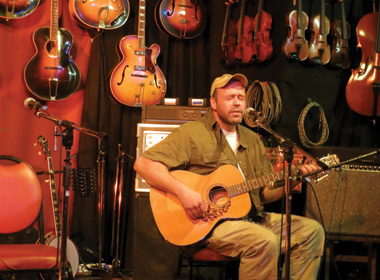During a recent show at the Luthier’s Co-op in Easthampton, the stage got pretty full. Across the front, three Co-op employees displayed their considerable musical talents. Jane Hamel bowed a violin; Louis Freilicher plucked a banjo; and Greg Silveira sang and played a resonator guitar. Between those last two, a Beagle-esque canine sat looking happily out at the crowd.
The dog seemed right at home, and had personally greeted most everyone who came through the door to see the first performer, singer/songwriter Josh Martin (who put down his guitar to man the drum kit for Silveira). That’s exactly the kind of vibe Silveira says the Co-op tries to foster. He hopes that a sense of community will be operative instead of the stricter performer/audience divide of most venues. Most people who frequent the place are, after all, musicians who could (and sometimes do) take the stage as well.
The Co-op isn’t quite like any other music spot in the Valley. The name isn’t affectation—the place really is an instrument repair shop. It’s also one of the best places around to find vintage instruments, with the emphasis on guitars. Presently, the walls bear some real treasures, from a ’50s Epiphone Zephyr Regent Deluxe (a hollowbody guitar with more buttons than would seem possible) to a ’60s Gretsch hollowbody similar to the one Pete Townshend played on Who’s Next, and much older Gibson acoustics. It’s like a living museum of guitar history.
The Co-op used to be only a repair and sale shop. It started in 2005, the brainchild of Frank Lucchesi and Dameron Midget. Midget repaired bowed instruments, Lucchesi stringed instruments.
“Frank passed away six years ago,” says Steve Baer, current co-owner of the Co-op. “Frank changed the way I thought about instruments. We wanted to keep it going.”
He explains that, after a year or so of working at the Co-op, he became one of the owners after Lucchesi’s death. The new and current incarnation of the original repair business is a “worker’s co-op—independent luthiers sharing tools and access to jobs. It’s one place people can bring their stuff [for all kinds of repairs].”
If you drop by, explaines Baer, you never know exactly who’ll be around to look at your instrument. All the same, it will end up with the luthier who specializes in your instrument or problem.
The “front of the house,” the part that’s mostly vintage guitar shop, runs more like a traditional music store, though you won’t find any new instruments on the walls.
Baer, whose primary work is the shop section, says he “had some experience doing music retail at Falcetti [Music Mall] in a previous life, so I’m familiar with newer instruments.” What he gained from Lucchesi, he says, is “appreciation for older instruments, how to maintain and take care of them so they’ll still be around in 100 years.” That’s why you’ll only find used instruments at the Co-op.
Maintaining vintage instruments truly is an art, one that demands a wide knowledge of their often-quirky construction and components, and an understanding of how to make repairs while leaving an instrument’s essential character intact. The Co-op exudes that kind of respect—the guitars that ride the wall behind performers offer a healthy sense of context, of the longstanding traditions of making music in America.
Because of interesting juxtapositions like that, adding a stage to the Co-op puts an intriguing element in the mix. The guitars don’t just sit on the walls here, they do what they were meant to do. After hosting shows for some time, including the open mic night that lived at the old PACE location on Easthampton’s Union Street, the Co-op’s owners decided to expand yet more.
“People kept saying they loved listening and playing because of the small rooom and good sound,” says Baer. “It was BYOB, but at the end of the day, getting a beer and wine license allowed us to expand the schedule. March 31 was grand opening [of the bar].Now we almost know what we’re doing!”
The Co-op’s scene is low-key but friendly. The stage sits to the side, crowding things a little, but also putting audience and performers close enough that they can easily chat between songs. It’s a bit odd to see people comfortably inhabiting bar stools beneath a line of vintage Gretches and Gibsons, and the guitar strings look as if they might end up in a cocktail. But it all seems to make sense—it feels rather as if the world musicians inhabit has spilled from the stage into the non-musician world. It makes for an unusually comfortable and unpretentious scene.
So far, says Baer, “We have a handful of [musicians] with a monthly spot. We are accumulating some regulars, and a lot of folks just dropping in to see what’s going on. We’re bringing people in from out of town—both audience and performers.”
Though Baer says all kinds of performers and genres are welcome, there’s a caveat: “The one thing is that, volume-wise, we’re trying to keep it low. If there’s a blaringly loud band, it’s too much for this room. It’s ranged from spoken word to a cappella to old-timey, bluegrass and folk. We’ve had up to nine people on stage.”
The night Martin and Silveira played, the room was humming with conversation, and the music made sense with the room. Martin offered sophisticated songwriting and dynamic vocals, and Silveira led a rollicking, fingerpicking trip into old-school blues. Even the dog had a good time.?Upcoming shows
at the Luthier’s Co-op:
Sept. 28: The Retroverts, Rebirth
Sept. 29: Bruce King, MR Poulopoulos, Flava Evolution
Oct. 2: Open Stage 7-9
Oct 3: Open Mic
Oct 4: Aspect Radio Lounge
Oct 5: Strictly Bluegrass jam



